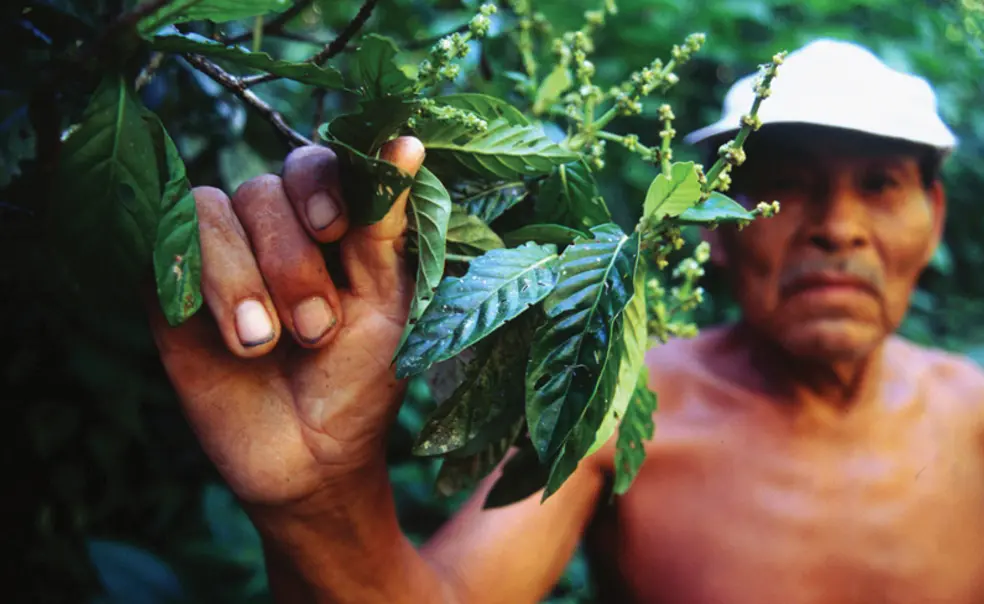Class Close-Up: Planting the Seeds of Ethnobotany at Princeton
Glenn Shepard ’87 teaches a class in ethnobotany called Psychedelics, Shamanism, and Plant Intelligence
Plant-based medicine has been around for thousands of years, but Glenn Shepard ’87 said he believes “these traditionally used plants are entering this whole new global marketplace” due to the rise of New Age spirituality and self-help.
In Shepard’s class Psychedelics, Shamanism, and Plant Intelligence, offered for the first time this spring, students from a mix of majors and class years are exploring ethnobotany, which studies how people use plants. Botany, pharmacology, and anthropology all touch on the subject, but Shepard said there has been a general lack of “an integrated vision of how plants and spirituality and healing, mythology, symbolism, social structure — they all come together in this phenomenon of shamanism and psychedelic plants.”

The 50-person class had a 53-person wait list, “a testament to how” ethnobotany “is a very important area [of] science that needs to be further explored,” said Lillie Szemraj ’26,
an astrophysics major. Class discussions have included the ethics of commercialization and how to increase the inclusion of Indigenous peoples in modern usage.
Josh Greer ’26, a politics major, U.S. Marine Corps veteran, and former humanities fellow of the Warrior-Scholar Project, enrolled after hearing from combat veterans who used psychedelics to help transition out of the military. The veterans “went through a lot. They performed a lot, did a lot, saw a lot. And for them to talk about these taboo things,” like psychedelic medicine, “and how it’s helping them, it’s like, ‘Whoa, what?’ It [made] me curious.”
Shepard — a visiting professor from the Museu Paraense Emílio Goeldi, which he said is Brazil’s version of the Smithsonian — is cognizant of associated stigma. He attributes that in part to previous “non-respectful use” of medicinal plants in the West, for example during the 1960s and ’70s, and said “the original psychedelic revolution went off the rails because there wasn’t the respect for traditional knowledge that allows these things to be used safely for hundreds of years.”
The course examines “Indigenous knowledge and how that knowledge has always been there, but it has to be confirmed by Western science before it seems to be accepted or useful,” according to Desmen Boykin ’27, an ecology and evolutionary biology major.
Boykin appreciates Shepard’s personal stories from his years in Brazil, where he has lived since 2000, which “make the lecture very interesting and engaging.”
For the final, groups are researching plants, fungi, and mushrooms that have been traditionally used for medicinal purposes, which Shepard will compile to create an online encyclopedia.












2 Responses
Dennis McKenna
10 Months AgoExpanding the Reach of this Subject
Glenn Shepard is a friend and respected colleague in this field. See his presentations at the McKenna Academy at ESPD50 (2017) and ESPD55 (2022).
Glenn is the real deal, and he is a pioneer in bringing this important subject to a wider world. On April 9, I am honored to be presenting a lecture to this anthropology class at his invitation. I look forward to meeting with many of you.
Vicki L. Grossman
4 Months AgoImportant Chance to Fill a Void
As a psychiatric provider for many years, I am extremely grateful someone has brought this information to the academic community. This is absolutely and profoundly needed within the psychedelic information system. I see this as a huge void in this far-reaching journey of healing potential with plant medicine. This important context for psychedelic medicine is not being addressed within the medical community, and only minimally mentioned with death and dying research. That may be the only opening thus far that I have detected. I only have my own Shamanic experiences to draw from; however, I find Shamanism and Indigenous cultures to be scarcely mentioned even within psychedelic training classes. Perhaps the people in the programs I have encountered have not been exposed to Indigenous knowledge within this framework? Ethnobotany is a magnificent introduction to the world of spiritual healing potential that is held by plant medicine. I have enormous gratitude for your work.